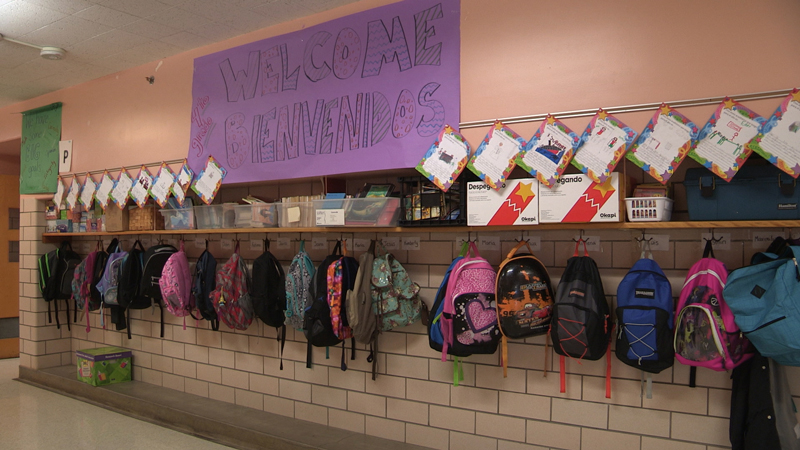Request Information
Ready to find out what MSU Denver can do for you? We’ve got you covered.
 In the Department of Elementary Education and Literacy, our goal isn’t simply graduating future elementary teachers. We aim to empower our Elementary Education Majors to change their lives, their communities, and our future generations.
In the Department of Elementary Education and Literacy, our goal isn’t simply graduating future elementary teachers. We aim to empower our Elementary Education Majors to change their lives, their communities, and our future generations.
The Bachelor of Arts in Elementary Education allows you to differentiate your learning through choices in coursework by choosing a licensure or non-licensure pathway and in selecting one of five concentrations:
At the same time, all Elementary Education Majors develop common educational knowledge that they apply during experiential learning.
Licensure Pathway
In addition to immersive field experiences throughout the program, you will experience two consecutive semesters in the Elementary Teacher Residency. You will spend significant time in an elementary classroom each semester at one of our partner public schools in the Denver metropolitan area. Each residency semester is intentionally paired with a hybrid co-requisite course and a residency seminar to further strengthen the professional abilities you bring into your first year of teaching.
Non-Licensure Pathway
For students not pursuing licensure, the extended residency with co-requisite coursework is replaced by coursework that prepares them for careers that build upon their expertise in teaching, learning, and education.
Field Experience Coursework
All students in this major will complete three 45-hour field experience courses throughout their program. For each course, you will be placed in a K-6 classroom with one of our partner Elementary schools in the Denver metropolitan area.
Your first field experience course focuses on instruction and assessment, the second on literacy, and the third on math and science.
Students on the licensure pathway will complete two semesters of residency in the last year of their degree program. Review some of the key details of this part of your program:
Residency I:
Residency II:
Note to Student Athletes:
If you are a student athlete who plays an NCAA sport at MSU Denver, contact the department chair, Dr. Corey Sell ([email protected]) during your first semester to learn more about how our year-long residency works when you are a student athlete.
 Benefits of Program Coursework:
Benefits of Program Coursework:
Benefits of the Elementary Teacher Residency for licensure students:
Speak with an Elementary Education advisor to learn how your Teacher Cadet credits apply in our programs!

Career opportunities include teaching as a licensed K-6 general education classroom teacher in Colorado. Earning a state teaching license affords you more opportunities for expanding your professional career within districts, often leading to teachers on special assignment (TOSA), instructional coaches, or other administrative or leadership positions within schools or the district.
Our concentrations support graduates in competitively applying for specialized positions, such as Mathematics-Science or Language Arts-Social Studies positions for a grade-level cluster.
Some alumni utilize their credentials and skills in non-profit positions or connected to long-term goals related to serving families and children.
 Dr. Ingrid Carter
Dr. Ingrid CarterDr. Ingrid Carter is among our faculty recognized for exemplary teaching with her focus on inquiry-based science. Look for Dr. Carter and her students outside of the West Classroom – perhaps walking along Ninth Street Park as part of an inquiry walk or on an experiential learning field trip to places such as the Denver Museum of Nature and Science.
 Ali O’Brien
Ali O’BrienRecipient of the Faculty Senate Teaching Excellence Award, Ali O’Brien is a Literacy Lecturer and lead Elementary Residency Site Coordinator. Ms. O’Brien is part of a strategic team dedicated to the success of our yearlong residents. You might meet Ms. O’Brien during residency seminars, professional development with mentor teachers, and in our residency partner schools.
Our residency partner districts recruit students during the residency year, with hires occurring in these districts. However, residents are impacting communities across the state. Graduates of our Elementary Education Major are hired in school districts across the greater Denver metropolitan area and Front Range from Castle Rock to Boulder, and in other regions of Colorado.
Our partner districts include:
All School of Education teacher licensure programs are authorized by the Colorado Department of Education and the Colorado Department of Higher Education.
Location:
West Classroom: 132, 136, 162
Advising Appointments:
click to schedule
Phone:
(303) 615-1777
Email:
[email protected]